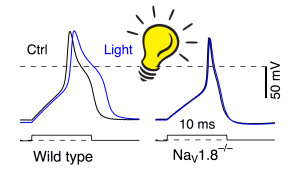Stress susceptibility of NaV1.8 channels in DRG neurons
Stimulated action potentials of DRG neurons before (black) and after 150 s illumination with blue light (blue) from wild-type (left) and NaV1.8-deficient mice (right).
Illustration: FSU BiophysikVoltage-gated sodium channel NaV1.8 is expressed in dorsal root ganglion (DRG) neurons that play an important role in the transmission of noxious signals. Here we show that reactive species profoundly alter the electrical signaling of DRG neurons. Low concentrations of chloramine T or exposure of cells to blue light (450-490 nm) increase the width of action potentials while reducing their frequency. Such an effect is not observed in mice lacking NaV1.8 channels. Ion currents mediated by NaV1.8 channels are particular sensitive towards oxidative modification, potentially giving rise to loss-of-function and gain-of-function phenomena depending on the type of reactive species and their effective concentration and time of exposure.
